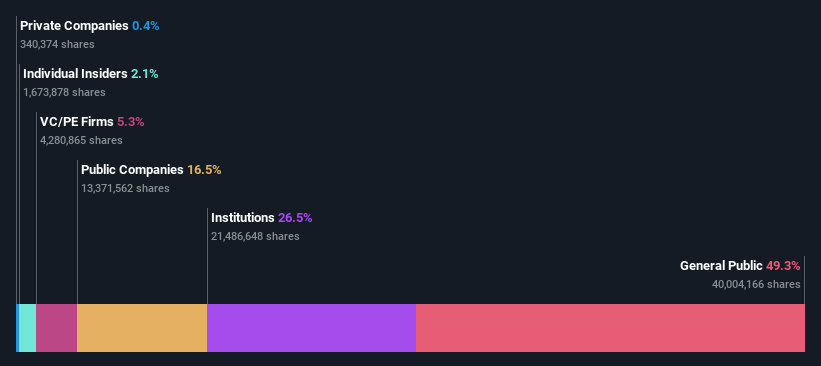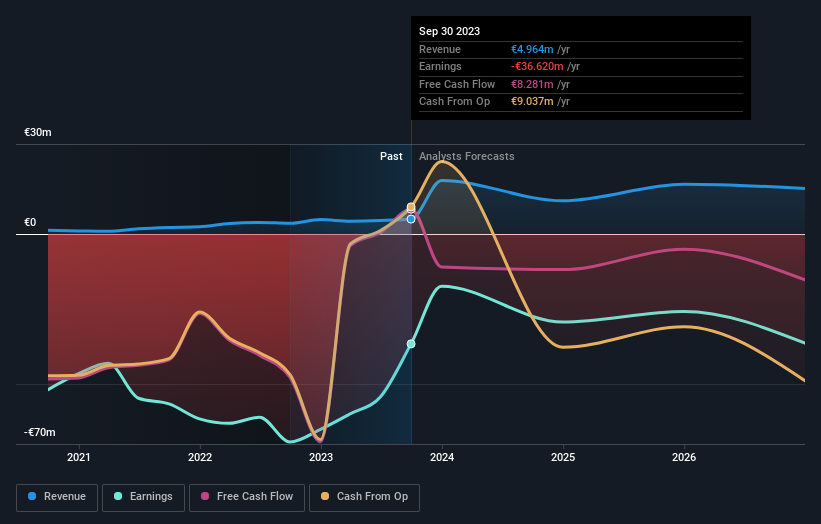While institutions invested in ProQR Therapeutics N.V. (NASDAQ:PRQR) benefited from last week's 12% gain, individual investors stood to gain the most
Key Insights
Significant control over ProQR Therapeutics by individual investors implies that the general public has more power to influence management and governance-related decisions
50% of the business is held by the top 25 shareholders
If you want to know who really controls ProQR Therapeutics N.V. (NASDAQ:PRQR), then you'll have to look at the makeup of its share registry. With 49% stake, individual investors possess the maximum shares in the company. That is, the group stands to benefit the most if the stock rises (or lose the most if there is a downturn).
Individual investors gained the most after market cap touched US$181m last week, while institutions who own 26% also benefitted.
Let's delve deeper into each type of owner of ProQR Therapeutics, beginning with the chart below.
Check out our latest analysis for ProQR Therapeutics
What Does The Institutional Ownership Tell Us About ProQR Therapeutics?
Many institutions measure their performance against an index that approximates the local market. So they usually pay more attention to companies that are included in major indices.
We can see that ProQR Therapeutics does have institutional investors; and they hold a good portion of the company's stock. This can indicate that the company has a certain degree of credibility in the investment community. However, it is best to be wary of relying on the supposed validation that comes with institutional investors. They too, get it wrong sometimes. If multiple institutions change their view on a stock at the same time, you could see the share price drop fast. It's therefore worth looking at ProQR Therapeutics' earnings history below. Of course, the future is what really matters.
ProQR Therapeutics is not owned by hedge funds. Looking at our data, we can see that the largest shareholder is Eli Lilly and Company with 16% of shares outstanding. For context, the second largest shareholder holds about 6.6% of the shares outstanding, followed by an ownership of 5.3% by the third-largest shareholder. Additionally, the company's CEO Daniel de Boer directly holds 0.9% of the total shares outstanding.
Our studies suggest that the top 25 shareholders collectively control less than half of the company's shares, meaning that the company's shares are widely disseminated and there is no dominant shareholder.
Researching institutional ownership is a good way to gauge and filter a stock's expected performance. The same can be achieved by studying analyst sentiments. Quite a few analysts cover the stock, so you could look into forecast growth quite easily.
Insider Ownership Of ProQR Therapeutics
While the precise definition of an insider can be subjective, almost everyone considers board members to be insiders. Management ultimately answers to the board. However, it is not uncommon for managers to be executive board members, especially if they are a founder or the CEO.
Insider ownership is positive when it signals leadership are thinking like the true owners of the company. However, high insider ownership can also give immense power to a small group within the company. This can be negative in some circumstances.
Our most recent data indicates that insiders own some shares in ProQR Therapeutics N.V.. It has a market capitalization of just US$181m, and insiders have US$3.7m worth of shares, in their own names. This shows at least some alignment, but we usually like to see larger insider holdings. You can click here to see if those insiders have been buying or selling.
General Public Ownership
With a 49% ownership, the general public, mostly comprising of individual investors, have some degree of sway over ProQR Therapeutics. This size of ownership, while considerable, may not be enough to change company policy if the decision is not in sync with other large shareholders.
Private Equity Ownership
Private equity firms hold a 5.3% stake in ProQR Therapeutics. This suggests they can be influential in key policy decisions. Some might like this, because private equity are sometimes activists who hold management accountable. But other times, private equity is selling out, having taking the company public.
Public Company Ownership
It appears to us that public companies own 16% of ProQR Therapeutics. We can't be certain but it is quite possible this is a strategic stake. The businesses may be similar, or work together.
Next Steps:
I find it very interesting to look at who exactly owns a company. But to truly gain insight, we need to consider other information, too. For instance, we've identified 2 warning signs for ProQR Therapeutics that you should be aware of.
If you would prefer discover what analysts are predicting in terms of future growth, do not miss this free report on analyst forecasts.
NB: Figures in this article are calculated using data from the last twelve months, which refer to the 12-month period ending on the last date of the month the financial statement is dated. This may not be consistent with full year annual report figures.
Have feedback on this article? Concerned about the content? Get in touch with us directly. Alternatively, email editorial-team (at) simplywallst.com.
This article by Simply Wall St is general in nature. We provide commentary based on historical data and analyst forecasts only using an unbiased methodology and our articles are not intended to be financial advice. It does not constitute a recommendation to buy or sell any stock, and does not take account of your objectives, or your financial situation. We aim to bring you long-term focused analysis driven by fundamental data. Note that our analysis may not factor in the latest price-sensitive company announcements or qualitative material. Simply Wall St has no position in any stocks mentioned.

 Yahoo Finance
Yahoo Finance 

